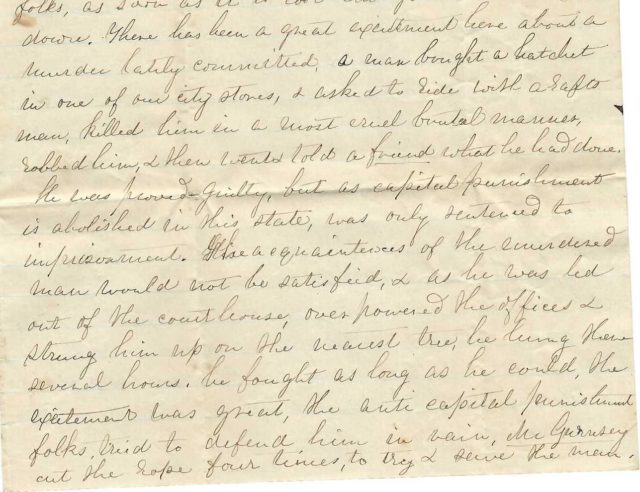“There has been a great excitement here about a murder lately committed.”
Maria Frost, July 18, 1855
In the course of researching Lavinia Goodell’s life and times, we have come across accounts of many little known, but interesting, historical events that impacted her or her family. For example, did you know that there was a public lynching in Janesville, Wisconsin in the summer of 1855? Here is the story that appeared in the Wisconsin State Journal:

On June 10, 1855, a man named David Mayberry, who had recently been released from an Illinois prison, learned that Andrew Alger, of Johnson Creek, Wisconsin (some 35 miles north of Janesville), who made his living as a raftsman on the Rock River, would be travelling between Beloit and Janesville with $600 cash in his possession. Mayberry managed to make Alger’s acquaintance and secured a ride to Janesville with him. During a stop in Janesville, Mayberry purchased a hatchet. He again met up with Alger and again got into Alger’s buggy. When the two men arrived at a woods northeast of Janesville, Mayberry struck Alger in the forehead with the hatchet and threw him into the woods. Alger begged for his life and offered to split the money with Mayberry. In response, Mayberry slit Alger’s throat and stabbed him multiple times. He then took Alger’s money and clothing, dragged the body into some bushes, and drove the dead man’s horse and buggy to Illinois, where he told an acquaintance what he had done. The acquaintance went to the Winnebago County, Illinois, Sheriff. Mayberry was arrested and brought back to Janesville for trial.
A three day trial commenced in Janesville in early July. The  evidence against Mayberry was overwhelming, and the jury deliberated only twenty minutes before finding him guilty. As Mayberry was being led back down the hill from the courthouse to the jail, a mob tried to seize him, but sheriff’s deputies kept them at bay. Mayberry was sentenced on July 12. In 1853, Wisconsin had been the first state to abolish the death penalty for all crimes, so Mayberry received the harshest sentence available, which was life in prison. Sheriff’s deputies were concerned about mob action and did not attempt to take Mayberry back to jail until 8:30 p.m. when they hoped the crowd would be at dinner. Unfortunately for Mayberry, the crowd made a rush and after several minutes, the officers were compelled to give way. A rope was thrown over Mayberry’s neck, and he was dragged back up the hill and hanged.
Lavinia Goodell’s sister, along with her husband and young son, had moved to a farm near the Institute for the Blind, south of Janesville, in 1854. On July 18, 1855, Maria Frost wrote to Lavinia providing her perspective on the murder and its aftermath:
There has been a great excitement here about a murder lately committed. A man bought a hatchet in one of our city stores & asked to ride with a raftsman, killed him in a most cruel brutal manner, robbed him & then told a friend what he had done. He was proved guilty, but as capital punishment is abolished in this state, was only sentenced to imprisonment. The acquaintances of the murdered man would not be satisfied & as he was led out of the courthouse, overpowered the officers & strung him up on the nearest tree. He hung there several hours. He fought as long as he could. The excitement was great. The anti-capital punishment folks tried to defend him in vain. Mr. Guernsey cut the rope four times, to try & save the man.

(As an interesting sidenote, the “Mr. Guernsey” Maria Frost referred to was Orrin Guernsey. He and his wife became good friends and comrades in the temperance movement when Lavinia lived in Janesville in the 1870s.)
Maria concluded her account of the lynching by declaring, “I am glad he was hung & hope the new law will be repealed, but I would not have witnessed the hanging for anything.”
Although the identities of the people in the mob who lynched Mayberry were likely known to authorities, there is no indication that any of them were charged with his murder.
Sources consulted: Maria Frost’s letter to Lavinia Goodell (July 13, 1855, 18, 1855); Wisconsin State Journal (July 16, 1855); The Weekly Wisconsin (July 4, 1855); Waukesha Plaindealer (June 26, 1955); https://deathpenaltyinfo.org/state-and-federal-info/state-by-state/wisconsin#:~:text=On%20July%2010%2C%201853%2C%20the,all%20crimes%20except%20treason%20in.








Hurray for Wisconsin’s abolition of the death penalty so early. It is interesting that my Christian
gg grandmother, an anti-slavery proponent, daughter of an slavery abolitionist and minister and wife of an abolitionist minister would support Old Testament eye for an eye punishment though she admits she would not personally want to witness it. Personal letters are such a wonderful window into history.